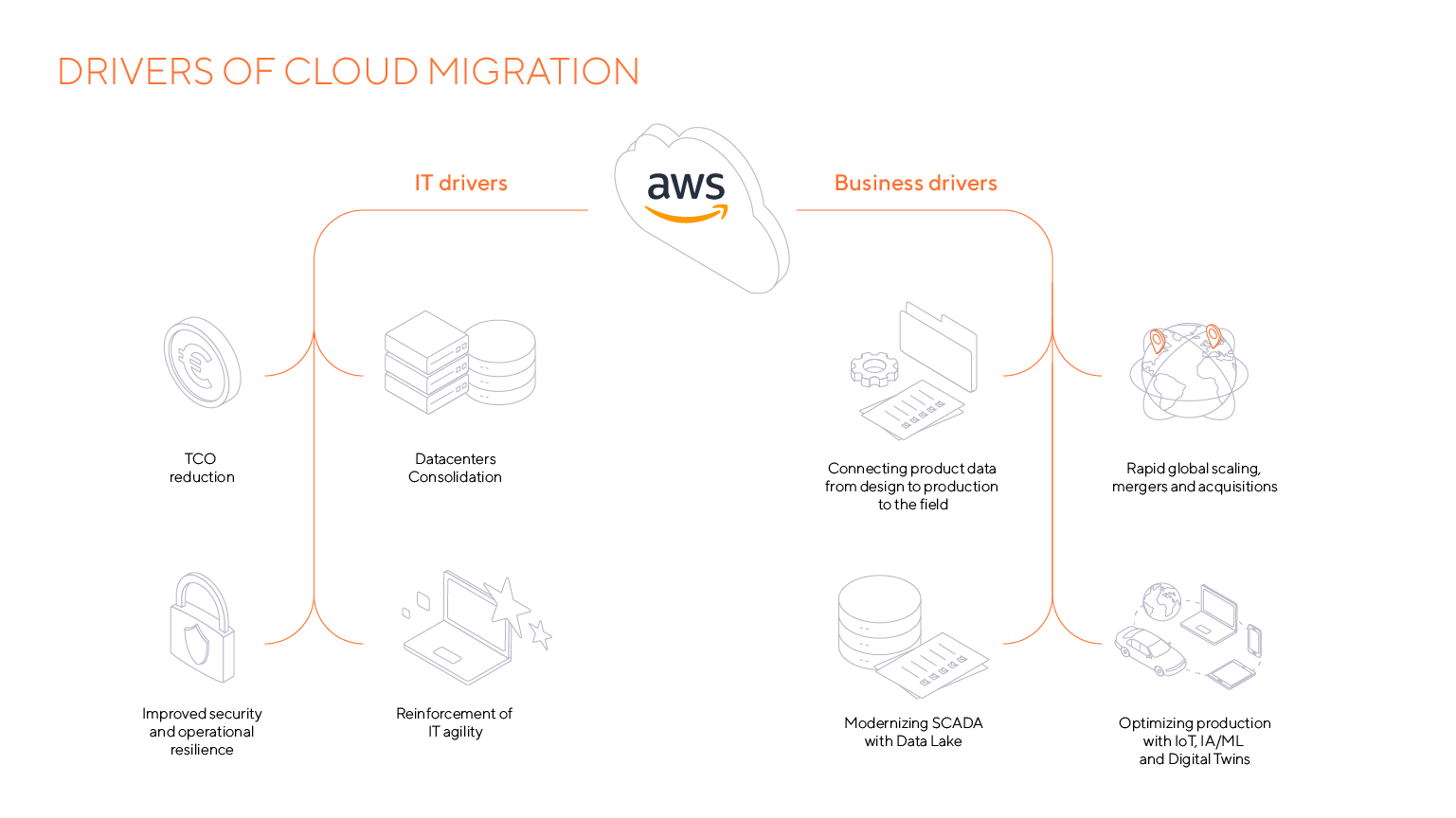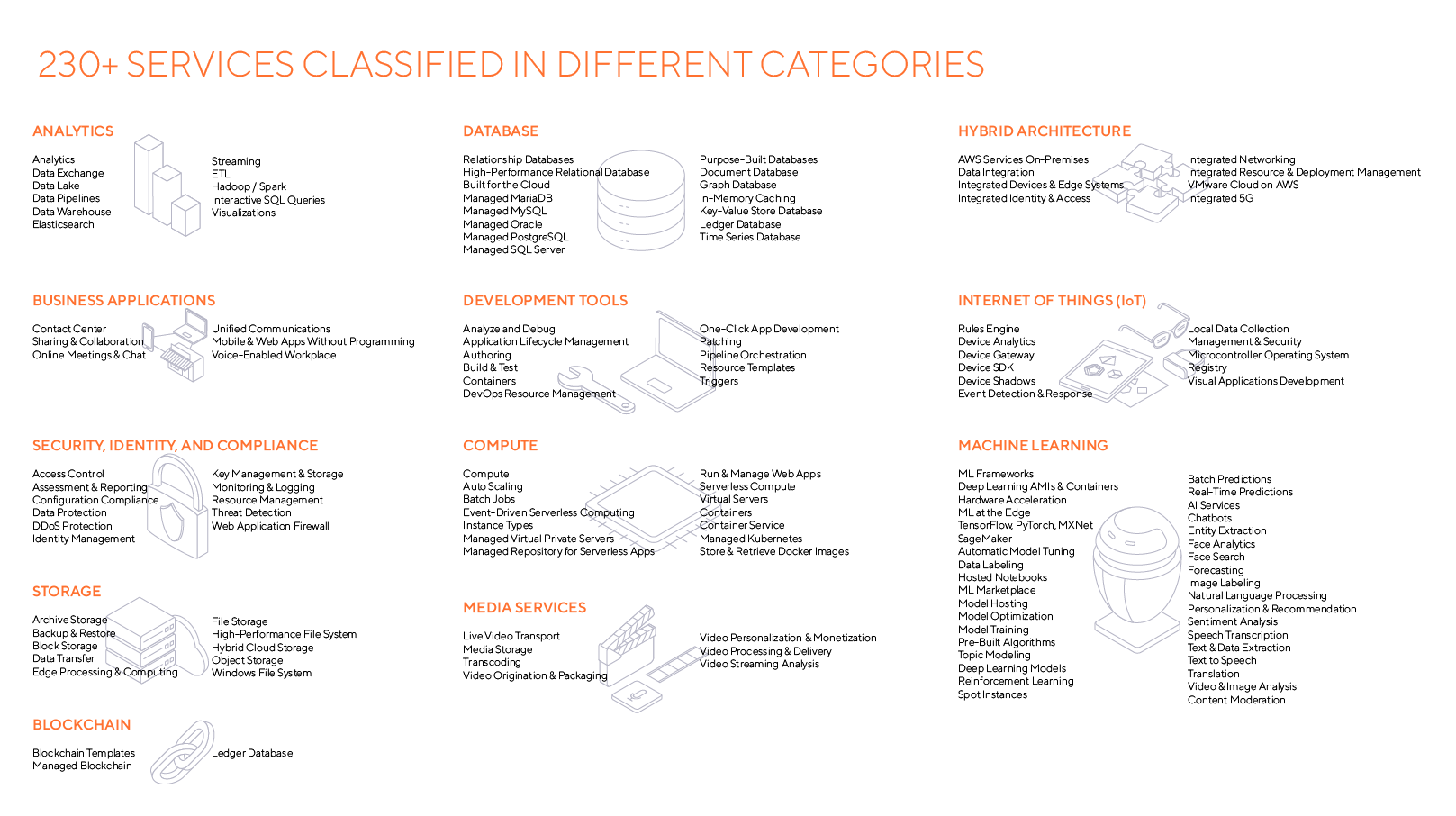AWS: the most efficient, reliable, and secure cloud solution in the world
AWS (Amazon Web Services) is the global leader in cloud solutions, offering over 200 highly comprehensive and high-performing microservices.
Our CPSM solution, the Cloud Pro for Business Solutions offer from DATASOLUTION, leverages AWS technologies. We’ve been an AWS partner for several years.
So, are you ready to migrate to the cloud with AWS?
What is AWS?
AWS (Amazon Web Services) is the global leader in cloud services that powers the Amazon.com website. It’s the most comprehensive cloud computing platform on the market, offering over 200 services. Millions of organizations, both public and private, across all industries, use AWS.
To recap, cloud computing is the provision of on-demand IT resources via the internet, with pricing based on actual usage.
AWS manages for you:
- Cloud infrastructure technologies, such as computing, storage, and databases
- Emerging technologies, such as machine learning and artificial intelligence
- Data lakes
- Internet of Things (IoT)
AWS offers an extensive variety of databases specifically designed for different types of applications. In fact, AWS brings together thousands of system integrator partners specializing in AWS services, including DATASOLUTION, as well as thousands of independent software vendors who have adapted their solutions to work with AWS.
Amazon Web Services has been the leader of Gartner’s Magic Quadrant for cloud infrastructure and services for many years. It helps major organizations like Netflix, Coca-Cola, and Moderna reduce infrastructure costs and accelerate innovation on the world’s most reliable, secure, and efficient cloud.
What business challenges does AWS address?
In the context of digital transformation, SMEs (Small and Medium Enterprises) and mid-sized companies increasingly consider migrating their traditional on-premise IT systems to a much more flexible cloud-based IT system.
Indeed, companies face numerous challenges:
- Streamlining system infrastructure expenses
- Adapting to increasing demands while maintaining the performance (scalability) of their information systems
- Protecting against the growing risk of cyberattacks, which increased by over 400% in 2022
- Accelerating digital transformation by leveraging the latest solutions
The cloud allows businesses to shift from fixed costs (purchasing data centers and physical servers) to variable costs. You only pay for servers when you use them. Thanks to economies of scale, these flexible costs are significantly lower than if these activities were managed in-house.

AWS offers a range of solutions that help companies manage and optimize their IT expenses.
AWS is certainly the cloud infrastructure solution of choice for large enterprises, SMEs, or mid-sized companies to address these digital transformation challenges.
The Amazon cloud solution meets business needs:
- Computing and storage power
- Immediate growth (scalability)
- Data security
The adoption of cloud computing solutions allows companies to shift their paradigm: they move their IT systems, originally organized around functions or applications, towards data. And data, particularly marketing data, represents the new wealth of companies.
I’d like a 100% personalized demo
Where does AWS fit within a company’s ecosystem?
Amazon Web Services occupies two key roles within a company’s ecosystem:
- AWS cloud solutions serve as the foundational layer (infrastructure) for integrated solutions such as e-commerce platforms, CMS, MDM (Master Data Management), PIM (Product Information Management), or DAM (Digital Asset Management) implemented by DATASOLUTION.
- AWS microservices enable the addition of new features to various business applications.
The entire business ecosystem can benefit from AWS microservices.

How do AWS services work?
All services are managed by AWS in terms of reliability, security, and more, meaning clients don’t need to worry about these aspects.
Since these are web services, developers and integrators can quickly leverage the functionalities offered by AWS.
AWS is built on four main types of technologies:
-
Machine Learning (ML/AI)
This subcategory of artificial intelligence (AI) involves allowing algorithms to identify recurring patterns within datasets, which may include numbers, text, visuals, and more.
-
Data storage
Durable and cost-effective solutions for backing up, enabling disaster recovery, and archiving enterprise data at scale.
-
Data lakes
A single repository for storing raw, native data from heterogeneous sources, ready for analysis.
-
Serverless computing
The creation and execution of applications and services without the need to manage servers.
-
Data storage
AWS offers a vast portfolio of storage solutions with features not only for storing data but also for access control, security, and data analysis. With AWS, you can accelerate time-to-market and reduce resource overallocation. AWS has implemented multi-availability zone data resilience for enhanced reliability.
-
Serverless products
Serverless technologies provide automatic scalability, built-in high availability, and a pay-as-you-go model that increases agility and optimizes costs. Serverless products eliminate the need for infrastructure management, such as capacity provisioning and patching.
-
Containers
AWS container services simplify the management of your underlying infrastructure, whether on-premises or in the cloud, with strong security isolation between containers. AWS offers the highest and most up-to-date levels of security and allows granular access permissions for each container. AWS provides over 210 security, compliance, and governance services.
-
Network and application protection
AWS services inspect and filter traffic to prevent unauthorized access to resources at the host, network, and application levels.
-
Internet of Things (IoT)
AWS offers IoT solutions to connect and manage billions of devices. With AWS, you can collect, store, and analyze IoT data for industrial, consumer, commercial, and automotive applications.
-
Detection
AWS detection and response services help you identify security misconfigurations, threats, or unexpected behaviors. This allows you to respond quickly to unauthorized or malicious activities in your environment.
-
Database
AWS provides over 15 purpose-built database engines to support different data models, including relational, key-value, document, in-memory, graph, time series, wide column, and ledger databases.
-
Web and mobile front-end
Amazon Web Services offers a wide range of tools and services to support development workflows for web developers, iOS/Android, React Native, and native JavaScript developers.
-
Identity and access management
AWS offers identity and access management services for personnel.
-
Compliance
AWS has implemented automated compliance controls based on AWS best practices and industry standards.
-
Data analytics
AWS provides a wide range of data analytics services that enable organizations to reinvent their business operations.
-
Data protection
With data encryption, key management, and the ability to discover sensitive data, organizations can protect their data and accounts from unauthorized access.
-
Networking and content delivery
With AWS, you can run any application on a highly secure global network with exceptional reliability and performance (high throughput and low latency). AWS’s region and availability zone model ensures the highest levels of availability for your critical applications.
-
Machine learning
AWS provides a comprehensive suite of AI and machine learning services. You can build new applications with AWS generative AI, solve business problems to enhance customer experiences, and optimize business processes using ready-to-use AI services or your own models.
-
Cloud financial management
AWS offers services, tools, and resources to organize and track cost data, enhance financial control through consolidated billing, and improve planning with budgeting and forecasting capabilities.
Why choose AWS cloud solutions?
The most extensive infrastructure in the world
Amazon Web Services is the largest cloud network globally and a leader in the cloud industry. AWS offers the most extensive global infrastructure compared to competing providers.
Adaptability to workloads
AWS provides instant scalability, adapting to workloads and customer needs. It offers best-in-class resilience and performance.
A wide range of microservices
In addition to its cloud computing offerings, AWS provides value-added microservices that enable the rapid deployment of business applications at a lower cost (AI services, notifications, mobile, data analytics, etc.).
Reduced TCO
The Total Cost of Ownership (TCO) is significantly lower. It is more cost-effective for a business to use AWS than to deploy its own servers. Companies only pay for the resources they actually need.
A highly secure cloud offering
One of AWS’s major advantages is its security. Its core infrastructure is designed to meet the security requirements of military forces, global banks, and other highly sensitive organizations. AWS provides a comprehensive suite of cloud security tools, with over 300 security, compliance, and governance services and features. AWS complies with 98 security standards and certifications, and all 117 services that store customer data offer encryption options.
The most sustained innovations
AWS pioneered cloud computing and continues to lead the market with constant innovations. AWS frequently invents entirely new technologies. For example, in 2014, AWS introduced serverless computing with AWS Lambda, allowing developers to run code without provisioning or managing servers. Additionally, AWS created Amazon SageMaker, a machine learning service that enables developers and data scientists to use machine learning daily, even without prior experience.
AWS in numbers:
- 2002: Founded
- 2014: Pioneer of the serverless computing space
- Amazon’s top profit-generating segment
- Over 200 fully-featured services
- 300 security, compliance, and governance services and features
- Millions of customers
- Tens of thousands of partners… including DATASOLUTION for France!


